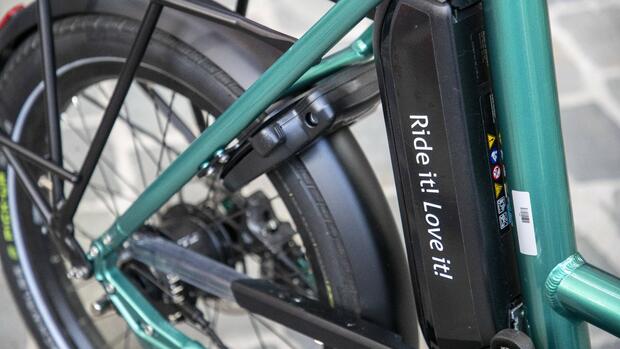Brussels On Wednesday, the EU Parliament passed new rules for batteries. For the first time, these are now regulated along the entire life cycle. “It’s revolutionary,” says Green MEP Malte Gallée. The ordinance replaces a previously applicable directive that only regulates the disposal of batteries. And it affects everyone who has a smartphone, laptop, e-bike, e-scooter or e-car or who buys a normal household battery – as well as their manufacturers.
Batteries are a key future technology, especially in the field of electromobility and are therefore crucial for the mobility revolution. But they also play a major role as electricity storage in the expansion of renewable energies – in addition to everyday devices such as smartphones and computers.
In her speech on the state of the Union, Commission President Ursula von der Leyen already announced that she would soon want to manufacture two thirds of the batteries needed in Europe. “We must ensure that the future of industry lies in Europe,” von der Leyen said in her speech. This also requires raw materials that can be reused from used cells.
The introduction of the battery pass and the requirement that batteries in laptops and mobile phones must be interchangeable in the future are likely to be relevant for consumers. The regulation also introduces a CO2 footprint, which regulates how much of the greenhouse gas can be emitted during the manufacture of batteries. It also sets recycling targets for different battery types.
The German Environmental Aid and the Federation of German Consumer Organizations (VZBV) welcome the ordinance, but in some respects it does not go far enough. “In some cases, we would have liked to have made faster progress with the transition periods,” says Gregor Kolbe from the VZBV. Meanwhile, Barbara Metz, Federal Managing Director of the German Environmental Aid, still sees shortcomings in the regulations on the ease of repair of electronic devices.
Resource reusability
The regulation is an important part of the European Green Deal, with which the European Union has committed to becoming climate neutral by 2050 and to reduce its greenhouse gas emissions by at least 55 percent by 2030 compared to 2030 levels.
>> Read also: Breakthrough in the heating law – These are the most important changes
At the same time, the question of the reusability of resources plays a central role in the competitiveness of the European Union, which wants to become more independent from countries like China and Russia. The focus is on the raw materials lithium, cobalt and nickel, important components of batteries for electric cars.
By the end of 2027, for example, 50 percent of the lithium used to make lithium-ion batteries should be recycled. By 2031 it should even be 80 percent. For nickel, 90 percent of the raw material used in batteries is to be recycled by the end of 2027 and 95 percent by 2031. So far, nickel has mainly been imported from Russia. With the beginning of the war of aggression against Ukraine, the prices for the metal had risen sharply.
With the regulation, the EU is also introducing a duty of care for companies. “In the future, companies that sell batteries in the EU will have to comply with regulations designed to prevent environmental and human rights violations in their supply chains,” said Delara Burkhardt of the SPD.
Consumers have often gone straight to a new product instead of simply replacing the battery. Delara Burkhardt, SPD
The ordinance issued by the German Environmental Aid for Metz does not go far enough with regard to the ease of repair of the electricity storage in e-cars. According to the regulation, individual cells or modules of a battery do not have to be interchangeable in the future for safety reasons. The consumer advocate would have liked more specific specifications for the interchangeability of individual cells or so-called packs.
The situation is different for light means of transport such as e-bikes or e-scooters. In the future, batteries such as rechargeable batteries in laptops or smartphones must be able to be replaced either by consumers themselves or by an independent specialist. So far, these have been built into the devices in such a way that they can only be replaced by the manufacturer and usually at high cost.
Replacing batteries is now easier
“Consumers have therefore often grabbed a new product directly instead of simply replacing the battery,” says SPD politician Burkhardt. The innovation should now contribute to a more sustainable circular economy. The rechargeable batteries and batteries must be available for replacement for at least five years after purchasing the device.
There is an exception for waterproof devices, which is where the criticism from consumer advocate Metz begins. Already, some smartphone makers advertise that their devices are “waterproof,” even though they’re not primarily made for underwater use. “Manufacturers could possibly use this passage as a loophole in the future,” says Barbara Metz.
The introduction of the battery passport should be clearly to the advantage for the consumer. The passport is intended to provide information about the lifespan, charge capacity and contents of the battery. In the future, a color code should make it easier for the consumer to identify the quality of the battery. “Until now, consumers could not see this at a glance,” says Green Party politician Gallée.
If the member states agree to the regulation, it will come into force immediately and does not first have to be transposed into national law. However, this may take until the beginning of next year.
More: EU officials are considering tougher heating rules than the federal government
